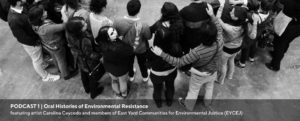
EN / ES
“Dominant industrial activities are all possible under the concept that humans are superior to the rest of the entities in nature. Obviously, within the human social structure, there are also hierarchies. So when you are female— when you are black, dark skin, indigenous, or when you are queer— you are at the bottom of that social structure. We as women, queer, black, dark-skinned, and indigenous are the ones that suffer the most from the effects, not only from patriarchy but also natural exploitation and extractivism. It is precisely our natural bodies—women, fish, tree, forest, river— that are required to be exploited and to be dispossessed of what we have. Right? Because, that is the core function of the structure.”
– Carolina Caycedo
As part of Unraveling Collective Forms exhibition activist members Jennifer Reyes, Dimas Efren Donis and Hilda Dueñas from East Yard Communities for Environmental Justice (EYCEJ) and artist Carolina Caycedo share stories of resistance in Los Angeles and other latitudes.
Artist Carolina Caycedo explains one of the portraits from My Femenine Lineage of Environmental Struggle (2018-) from the Genealogy of Struggle Series. The portrait being that of Angela Mooney D’Arcy, an indigenous activist working with Tribal Nations, Indigenous peoples, and grassroots organizations on Indigenous environmental justice issues for over fourteen years.
padding
“My Femenine Lineage of Environmental Struggle”, aims to visualize the stories of the women that are fighting, not only against a natural extractivism but also against a patriarchal structure. In other words, there could not be a fight without the other, they go totally together. And I think that all these women that are portrayed here, somehow symbolize and incarnate feminine values that include cooperation, care, care for others, empathy, vulnerability, receptivity, a vision of a whole, the emotional, resilience, that are values that are socially useful but that we can also say are desirable and universal for humanity, as a whole. So this is some idea behind the portrait of all these women.”
padding
In this episode, Jennifer, Dimas and Hilda discuss, among other ideas:
– Settler/colonial erasure
– Natural hierarchy and social hierarchy
– Exploitation and extractivism
– Environmental and economic racism
– The pain from immigrating at a young age
– Youth involvement in monitoring air pollution
Jennifer Reyes is a 16 year old Junior in Bell Gardens High School. She plays for the varsity waterpolo and swim team for BG High School and Commerce. She has been participating with East Yard and Youth in Action since freshman year.
Dimas Efren Donis is a Dreamer since birth, interested in all noble and just causes, Guatemalan and U.S. citizen, an immigrant in California, United States at 19 years old, married to Maria Candelaria with two children who are their pride and joy. Like many immigrants, Dimas has worked across different fields; he recently worked as a gas station manager.
“My name is Hilda Dueñas. I was born in Santa Lucia, municipality of Labarca Jalisco, Mexico. I am Mexican. I came to the United States when I was 17 years old looking for a better future, and got married in 1984 in Wilmington, CA. I worked in different places that allowed me to support my three daughters. When they started elementary school, I began to get involved in the Long Beach community. I’ve been a member of EYCEJ for 10 years, an organization that takes care of the environment. Today, I am a grandmother and continue in this fight, thinking about my grandchildren. I am now a citizen of the United States by means of naturalization and I feel more secure living in this country of immigrants.”
—
East Yard Communities for Environmental Justice (EYCEJ) is a community-based organization that works to facilitate self-advocates in East Los Angeles, Southeast Los Angeles and Long Beach. By providing workshops & trainings, EYCEJ prepares community members to engage in the decision-making processes that directly impact their health and quality of life.
Carolina Caycedo (b. 1978) was born in London to Colombian parents. She transcends institutional spaces to work in the social realm, where she participates in movements of territorial resistance, solidarity economies, and housing as a human right. Through work that investigates relationships of movement, assimilation and resistance, representation and control, she addresses contexts, groups and communities that are affected by developmental projects, like the constructions of dams, the privatization of water, and its consequences on riverside communities. She lives and works in Los Angeles.
